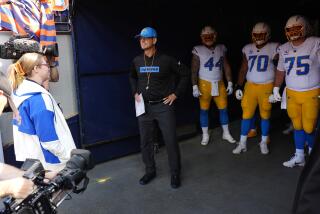NFL Assistant Coaches Work in Anonymity
- Share via
They’re the men behind The Man.
While NFL head coaches sign six-figure contracts and go on to lucrative broadcasting careers, their assistant coaches devise playbooks in relative obscurity and change jobs with alarming regularity.
Even the most meddlesome of head coaches--Miami’s Don Shula and Ray Perkins of Tampa Bay head the list--don’t have the time to deal with every detail of a game plan that changes with each new opponent. They have to delegate authority and do something distasteful to their very nature.
They have to trust somebody.
NFL assistants bring contrasting backgrounds and varying football philosophies to the job, but most share a common goal--to be a head coach. Only two active NFL head coaches--Detroit’s Darryl Rogers and Ron Meyer of Indianapolis--came to the job with no experience as an NFL assistant coach.
“Everyone asks me the secret of our turnaround here,” says Meyer, who inherited an 0-13 club on Dec. 1, 1986 and led the Colts to the AFC East title last season. “I tell people there are a bunch of factors, but at the top of the list is the retention of an outstanding coaching staff.”
One of Meyer’s best assistants is receivers coach Chip Myers, a former standout wide receiver for Cincinnati under the tutelage of former Bengal assistant Bill Walsh.
“Walsh made football fun for me and I try to make it fun for our players,” says Myers. “Bill’s advice to me about being an assistant coach was to go to college and learn how to teach. I went to Illinois under Mike White and I learned. I was in private business for two years after I quit playing and I disliked every minute of it. I have a lot of input here at Indianapolis and when my play works, it makes me feel great.”
One of the toughest aspects of an assistant coaching job is dealing with the anonymity. With the exception of flamboyant personalities like Buddy Ryan, assistants seldom make headlines until they reach the goal of becoming head coach.
“Everybody in the game knows what a great job they do,” says NFL analyst Stram, who assembled a terrific coaching staff in Kansas City two decades ago. “The vice-president of the United States doesn’t get any credit, either, but that’s the way it is. As an assistant, you have to have a philosophy and exercise that philosophy--but it’s got to be the philosophy of the head coach. The game has changed dramatically behind the scenes since I was a head coach. With the 15 assistants on staffs today, there’s no question the coordinators are running the program and calling plays.”
Phil Krueger, assistant to Tampa Bay owner Hugh Culverhouse and a former Buccaneer assistant coach for John McKay, points out some compensations for the men toiling in the background.
“Professional football pays well for an assistant, so there is good financial renumeration,” says Krueger, who also was a head coach at Fresno State and Utah State. “No. 2, you don’t have to recruit as an assistant in the pro game. When you have the opportunity to join the staff under an NFL coach, you discuss the situation and either you agree to do it the way he wants it done, or you don’t take the job. The atmosphere of winning is set by the head coach; he sets the tone. I’ve known a lot of great assistants who wouldn’t succeed as coaches.”
While NFL head coaches serve as the organization’s front men, they also become the focal point for public approval or public wrath. The last thing they need to worry about is looking over their shoulder at an ambitious assistant running their program.
“If you don’t have enough confidence in the head coach and he doesn’t have confidence in you, you’re in trouble,” says Tampa Bay receivers coach Richard Williamson, who left a volatile situation in Kansas City. “Head coaches get most of the press coverage on this level, but you realize that when you take the job. The whole thing is much more of a business in the pros . . . you’re not educating anybody.”
Former Kansas City head coach John Mackovic knows all about the crucial relationship between a top man and his assistants. Although the Chiefs ended a 14-year playoff drought with a 10-6 mark in 1986, Mackovic was fired after a players’ revolt led by kicker Nick Lowery. Some of Mackovic’s assistant coaches quietly fueled the insurrection and owner Lamar Hunt ended up selecting Frank Gansz, the Chiefs’ special teams coach, as Mackovic’s replacement.
“All of us as assistants have aspirations to be head coaches,” says Myers, “and we’re all striving for the same goal. That’s what makes the assistant job easier to handle.”
More to Read
Go beyond the scoreboard
Get the latest on L.A.'s teams in the daily Sports Report newsletter.
You may occasionally receive promotional content from the Los Angeles Times.










